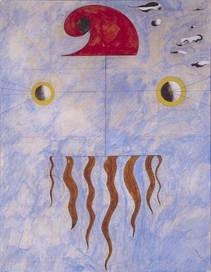Miró
14 Apr - 11 Sep 2011

Joan Miró, Head of a Catalan Peasant, 1925
Tate © Succession Miro / ADAGP, Paris and DACS, London 2008
Tate © Succession Miro / ADAGP, Paris and DACS, London 2008
Joan Miró's works come to London in the first major retrospective here for nearly 50 years. Renowned as one of the greatest Surrealist painters, filling his paintings with luxuriant colour, Miró worked in a rich variety of styles. This is a rare opportunity to enjoy more than 150 paintings, drawings, sculptures and prints from moments across the six decades of his extraordinary career.
Miró is among the most iconic of modern artists, using a language of symbols that reflects his personal vision, sense of freedom, and energy. The exhibition includes many of the key works that we know and love. It also shows that, behind the engaging innocence of his imagery, lies a profound concern for humanity and a sense of personal and national identity. Extraordinary works from different moments of his career celebrate his roots in his native Catalonia.
The exhibition also traces an anxious and politically engaged side to Miró’s work that reflects his passionate response to one of the most turbulent periods in European history. Working in Barcelona and Paris, Miró tracked the mood of the Spanish Civil War and the first months of the Second World War in France. Under the political restrictions of Franco's Spain, Miró remained a symbol of international culture, and his grand abstract paintings of the late 1960s and early 1970s became a mark of resistance and integrity in the dying years of the regime. Telling the story of Miró's life and the time he witnessed reveals a darker intensity to many of his works.
This is a must-see exhibition for 2011, filled with astonishing, beautiful and striking paintings by one of the greats of modern art.
Miró is among the most iconic of modern artists, using a language of symbols that reflects his personal vision, sense of freedom, and energy. The exhibition includes many of the key works that we know and love. It also shows that, behind the engaging innocence of his imagery, lies a profound concern for humanity and a sense of personal and national identity. Extraordinary works from different moments of his career celebrate his roots in his native Catalonia.
The exhibition also traces an anxious and politically engaged side to Miró’s work that reflects his passionate response to one of the most turbulent periods in European history. Working in Barcelona and Paris, Miró tracked the mood of the Spanish Civil War and the first months of the Second World War in France. Under the political restrictions of Franco's Spain, Miró remained a symbol of international culture, and his grand abstract paintings of the late 1960s and early 1970s became a mark of resistance and integrity in the dying years of the regime. Telling the story of Miró's life and the time he witnessed reveals a darker intensity to many of his works.
This is a must-see exhibition for 2011, filled with astonishing, beautiful and striking paintings by one of the greats of modern art.
